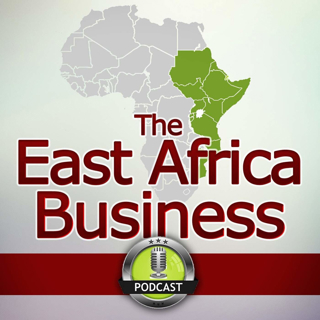
The exciting ways brands can engage with a growing youth market in Uganda, with Belguin Prosper
Uganda has the world’s youngest population. Brands are waking up to the idea that if they can create loyalty amongst this large section of society, they will reap the rewards for years to come. But how? Well a lot of them are going to Belguin, who started Young & Free International, an organisation that helps brands engage with the youth of Uganda. Belguin gives an excellent overview of his journey so far, what campaigns he has seen work best, and what he learned from hosting a cultural exchange with students from Somalia… READ MORE AT:https://theeastafricabusinesspodcast.com/2016/11/09/marketing-how-brands-engage-with-the-growing-youth-market-in-uganda-with-belguin-prosper-of-young-and-free-international/
9 Nov 201633min

Make up for African women - why imported cosmetics don't work and no-one trusts the Chinese
Make up is not an industry that I can profess to know much about, but after speaking with Sylvia, the founder of Paramour Cosmetics, I feel I know a lot more In this episode we talk about how Western make up is unsuitable for African women, the way that Sylvia trains her staff to help customers with their mental wellness, and how the business is looking to expand in the US after Sylvia was accepted onto a programme designed by President Obama to find the next 1000 African leaders who will make an impact. Sylvia was also the person who introduced me to Gloria (the founder of Kampala Fashion Week) and so if you’re interested in more about East African beauty and fashion, be sure to give that episode a listen too. For now at least I hope you enjoy Sylvia and I’s conversation all about make up. READ MORE AT:https://theeastafricabusinesspodcast.com/2016/11/02/make-up-growing-the-ma
2 Nov 201646min

How a credit marketplace can unlock the potential in SMEs, with George Bakka from Patasente
Interest rates in Uganda, and indeed the whole East Africa region, are by Western standards, very high. A small business looking for a short term loan from a bank will be expected to pay in the region of 10% interest per month. In an economy where payment is often made upon delivery, this causes problems in terms of getting access to working capital. In this episode, Bakka and I discuss Patasente, the platform he has started to essentially crowdfund credit agreements for small businesses so that they can raise funds to take on new contracts that come in, and grow their business. READ MORE AT:https://theeastafricabusinesspodcast.com/2016/10/26/sme-financing-building-an-enterprise-focused-credit-marketplace-with-george-bakka-from-patasente/
26 Okt 201635min

Glass half full: how Jibu's innovative franchise provides clean, affordable water across East Africa
If you consider businesses that solve Tier A problems, safe drinking water is pretty much top of the list. Across East Africa people are unable to drink from the tap, and so are left to either boil their own, or buy expensive water in a bottle. Galen started Jibu to address the need, creating a franchise where local entrepreneurs could treat tap water at source and sell it in reusable bottles to people in their neighbourhood. We discuss how the business started, the benefits and challenges that come from the franchise model, and Jibu’s vision to provide convenient safe drinking water for all. READ MORE AT:https://theeastafricabusinesspodcast.com/2016/10/19/bottled-water-franchise-decentralising-water-treatment-to-empower-entrepreneurs-in-east-africa-with-galen-welsch-of-jibu/
19 Okt 201642min

New York, Paris, Kampala..? How and why Gloria Wavamunno started Uganda's international Fashion Week
Across the world the pinnacle display of a country’s fashion is its annual “Fashion Week”. London, New York and Paris lead the way in this showcase of designers pushing the frontiers of design and style. Until Gloria Wavamunno started it a couple of years there was no Fashion Week in Kampala, Uganda. In this episode we discuss how and why she started the event, and cover a lot about the cultural and societal issues around fashion as well as giving an overview of the creative industries as a whole. Kampala Fashion Week 2016 is 20th – 22nd October 2016 READ MORE AT:https://theeastafricabusinesspodcast.com/2016/10/12/fashion-how-and-why-gloria-wavamunno-started-kampala-fashion-week/
12 Okt 201643min

Smoothies: how a growing Rwandan enterprise sells healthy juices, with Anitha Dusabe of Twistiblendz
There’s (literally) tonnes of fruit in Rwanda, but only a tiny fraction of it ends up being whizzed up and drunk as smoothies. When it does, it’s usually at Twistiblendz. I speak with Anitha about the leap she took to start the venture (in partnership with Giles and an organisation named SMGF), her plans for expansion, and the general market for healthy produce in the countryREAD MORE AT:https://theeastafricabusinesspodcast.com/2016/10/05/smoothies-a-small-but-growing-rwandan-enterprise-selling-healthy-juices-with-anitha-dusabe-of-twistiblendz/
5 Okt 201627min

How using solar energy can drastically improve how farmers water their crops, with Flavia Howard
Water is fundamental to any sort of agricultural business. As it stands, a large portion of Rwandan farmers only get it from the sky, in the form of sporadic rainfall. This is despite plentiful lakes full of water being mere metres away. Irrigation is the general term process for artificially getting water on these crops, and Flavia and I discuss her evaluation of the market and the product she has been looking at (Future Pump) that provides a solar powered irrigation pump to smallholder farmers. READ MORE AT:https://theeastafricabusinesspodcast.com/2016/09/28/irrigation-systems-an-overview-of-innovations-in-how-farmers-in-rwanda-water-their-crops-with-flavia-howard/
28 Sep 201632min

Beanz Meanz Development: value addition by cooking and packing nutritious beans
From a GDP perspective, any business that “adds value” to a supply chain is a good thing. Traditionally countries like Rwanda have been just growing agricultural produce, with other companies/ countries undertaking investment and reaping the benefits of manufacturing of a higher value product. FarmFresh is different in that regard. I visited Christian Heremans at their “pilot factory” (a converted house) to see how his company are taking raw beans, and turning them into well packaged cooked beans for consumption in and out of Rwanda. READ MORE AT:https://theeastafricabusinesspodcast.com/2016/09/21/cooked-beans-the-food-business-of-bean-processing-in-rwanda-with-christian-heremans-of-farmfresh/
21 Sep 201629min





















